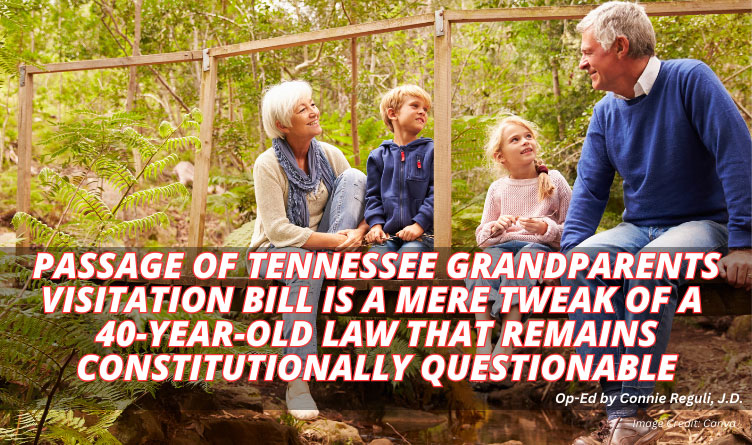Image Credit: Canva
Submitted by Connie Reguli, J.D. (Family Policy Specialist and Activist) –
This year the General Assembly tweaked Tennessee’s grandparent visitation statute found at T.C.A. 36-6-206. (HB2911/SB2840)
This is not new nor does it make a substantial change to the prior law that was first passed in 1985 and amended nine times since. Although there is great empathy, and likely social value, in children being able to maintain a relationship with their grandparents, the question remains when should grandparents rights trump the inalienable constitutional right to parent?

In 1993, the Tennessee Supreme Court spoke about the fundamental right to parent and found that: When no substantial harm threatens a child’s welfare, the state lacks a sufficiently compelling justification for the infringement on the fundamental right of parents to raise their children as they see fit. Thus, the Grandparents’ Visitation Act, Tenn. Code Ann. § 36-6-30, is unconstitutional under Tenn. Const. art. I, § 8, as applied to a married couple whose fitness as parents is unchallenged. Hawk v. Hawk, 855 S.W.2d 573, 575 (Tenn. 1993)
The Hawk case went on to say that the right of a parent to rear a child has long been protected from state interference, except where the child’s welfare is materially jeopardized. Since Hawk, there have been 250 cases before the Court of Appeals on grandparent visitation. Most of the time the parent prevails.
Several statutory changes have been made to the grandparents visitation law since the Hawk decision in order to carve out that narrow exception where ‘fitness’ of the parents has been challenged. Now the language of the law includes a requirement that the court find ‘the presence of a danger of substantial harm’ to the child which can include proving that the child had a substantial relationship with the grandparent and was cut off by the parent. There has not been an effective constitutional challenge since Hawk.
The 2024 version adds one sentence, “Reasonable visitation [with the grandparent] must constitute, at a minimum, sufficient contact to reasonably permit a strong and meaningful relationship to be established with the child.”

Tennessee also passed the Families Rights and Responsibilities Act of 2024 with the House vote on April 23, 2024. (HB2936/SB2749) Significantly, just before passage Rep. Chris Todd moved for the adoption of an amendment that would remove any reference to the U.S. Constitution from the bill. The language in this ‘parental rights’ bill only protects parents from unlawful intrusion into the rights by a government entity or healthcare provider, not third parties, like grandparents.
Effective constitutional challenges require three things: (1) a case, real people whose lives have been affected by the law; (2) an aggressive and brilliant attorney willing to spend hours drafting legal memorandums; and (3) the money to pay that lawyer. That combination is a rare find.
Until then, more litigation will arise which will no doubt place more children in the clutches of the courtroom where decisions are made, not by their parents, but by a judge who has never met them, never raised them, and will forget their name before the day is over.

About the Author: Connie Reguli has a doctorate in law and worked the Tennessee court system for 28 years, primarily in the area of family law and child welfare. She has more more than forty cases in the appellate court and significant Supreme Court decisions carving out the law for Tennesseans. She is a contributor to Tennessee Conservative News.


